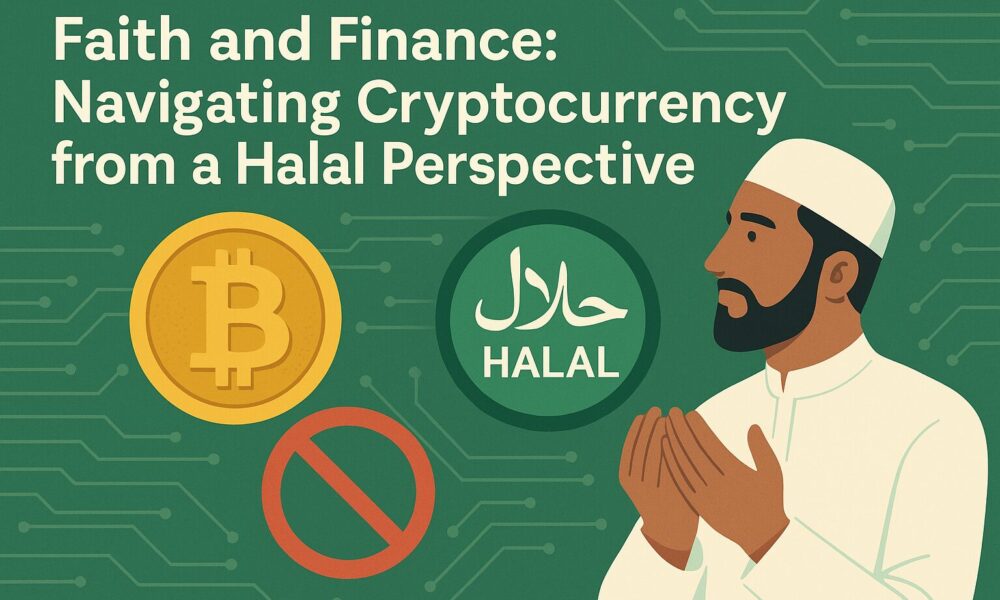Faith and Finance: Navigating Cryptocurrency from a Halal Perspective

Cryptocurrencies have transformed the financial landscape, offering decentralized, transparent alternatives to traditional money. For Muslims, the question of whether these digital assets align with Sharia law is critical. The debate around “is bitcoin haram” remains central to discussions on faith and finance. This article explores how Muslims can navigate cryptocurrencies from a halal perspective, drawing on Islamic principles, scholarly opinions, and practical insights to guide ethical participation in the crypto market.
Sharia Principles Governing Financial Transactions
Islamic finance is rooted in the Quran and Hadith, emphasizing justice, transparency, and shared risk. Key prohibitions include riba (interest), gharar (excessive uncertainty), and maysir (gambling). Assets must possess intrinsic value, be tied to real economic activity, and avoid speculative practices resembling chance-based games.
Cryptocurrencies like Bitcoin and Ethereum operate on blockchain, functioning as mediums of exchange, stores of value, or utilities in digital ecosystems. Their decentralized nature aligns with Islamic ideals of fairness, but their volatility and lack of tangible backing raise concerns. Scholars assess whether they qualify as “mal” (wealth) – assets with utility and acceptability. A cryptocurrency free of riba and gharar may be halal; otherwise, it risks being haram.
The Debate: Is Bitcoin Haram?
The question “is bitcoin haram” divides Muslim scholars, reflecting the complexity of applying Sharia to modern finance. No consensus exists, with views ranging from prohibition to conditional permissibility, driven by interpretations of volatility, utility, and intent.
Some scholars argue Bitcoin lacks the stability required for money in Islam due to its intangible nature and price swings. Others view it as a digital commodity, permissible if used for legitimate purposes. The debate has spurred fatwas from institutions like Egypt’s Dar al-Iftaa and Indonesia’s Ulema Council (MUI), with discussions on platforms like social media amplifying the discourse.
Scholarly Arguments for Permissibility (Halal)
Proponents of cryptocurrencies argue they can comply with Sharia under specific conditions. Mufti Faraz Adam considers many digital assets as mal if they provide utility, such as access to services or ownership rights within their networks. He cites al-Urf al-Khass (customary practice in specific groups) to support their use as mediums of exchange.
Ziyaad Mahomed, Shariah Committee Chairman at HSBC Amanah Malaysia, emphasizes blockchain’s transparency and traceability, aligning with Islamic finance’s focus on honesty. In 2025, a Saudi Salafi cleric issued a fatwa declaring Bitcoin halal, viewing it as a currency subject to zakat, potentially encouraging adoption in Muslim-majority regions. Mufti Muhammad Abu-Bakar argues that speculation exists in all currencies, not uniquely disqualifying Bitcoin.
For halal trading, spot transactions without leverage avoid riba. Cryptocurrencies tied to decentralized finance (DeFi) protocols using mudarabah (profit-sharing) or musharakah (partnership) are more likely permissible, as they align with risk-sharing principles.
Scholarly Arguments Against Permissibility (Haram)
Critics assert that cryptocurrencies, including Bitcoin, are haram due to their speculative nature. Egypt’s Grand Mufti Sheikh Shawki Allam argues their price volatility, driven by market hype, resembles gambling, introducing excessive gharar. Shaykh Haitham al-Haddad warns that crypto’s anonymity facilitates illicit activities like money laundering.
In 2021, Indonesia’s MUI declared Bitcoin haram, citing its lack of physical backing and volatility. Monzer Kahf, initially open to cryptocurrencies, later highlighted manipulation risks. Academic studies argue that cryptocurrencies fail as stable money, as Islam requires asset-backed, non-volatile currencies. Futures trading, common in crypto markets, is widely seen as haram due to leveraged bets resembling maysir.
Short-term trading driven by hype often leads to losses, reinforcing the haram perspective. Muslims are advised to avoid such practices if they border on gambling.
Key Fatwas Shaping the Discourse
Fatwas provide critical guidance on whether “is bitcoin haram.” The 2025 Saudi fatwa declaring Bitcoin halal marks a potential shift, likely influencing Gulf states. Conversely, Egypt’s Dar al-Iftaa ruled Bitcoin haram in 2018, citing speculation.
A 2020 study in Heliyon found cryptocurrencies incompatible with Islamic money requirements due to volatility, explaining reluctance among Muslims. A 2023 Cointelegraph analysis suggests compliance is possible if assets have utility and avoid harm. Sharia boards like Amanie Advisors certify projects like HelloGold, a gold-backed cryptocurrency, as halal due to reduced volatility. Recent 2024-2025 papers recognize digital assets as mal if backed by real utility.
Practical Halal Alternatives in Crypto
Muslims seeking Sharia-compliant digital assets have options. Gold-backed tokens like OneGram tie value to physical gold, minimizing speculation. Platforms like GreenX offer ESG-focused, halal crypto trading, ensuring ethical investments.
Islamic DeFi projects use smart contracts for mudarabah without interest, aligning with profit-sharing principles. Non-fungible tokens (NFTs) representing tangible assets, such as property or art, may be halal if non-speculative. Traders should consult certified Sharia boards and focus on long-term holding to avoid gambling-like behavior.
Emerging blockchain-based sukuk (Islamic bonds) blend tradition with technology, offering compliant investment opportunities.
Navigating Crypto with Faith
Navigating cryptocurrencies from a halal perspective requires balancing faith and finance. The debate over “is bitcoin haram” underscores the need for Muslims to seek knowledge and consult reliable scholars. Intentionality is key: digital assets should serve real economic purposes, not speculative gains.
Spot trading, utility-driven assets, and Sharia-compliant DeFi align with Islamic principles. Conversely, leveraged or futures trading risks violating prohibitions on riba and maysir. With evolving fatwas, like the 2025 Saudi ruling, crypto adoption may grow, but Sharia compliance remains essential for barakah (blessings) in wealth.
Muslims can engage in the crypto market ethically by prioritizing transparency, utility, and long-term value, ensuring alignment with faith in the digital age.




